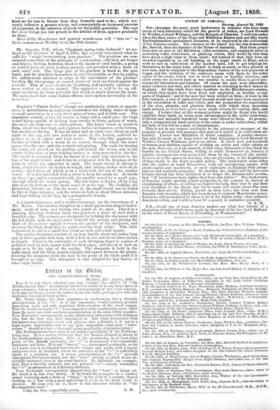tttttro to flit Ritur.
THE NORTHUMBRIAN BURR.
Hexham, 22d August, 1859.
SIR-I do not know whether you may consider the subject of " the Northumbrian Burr" of sufficient interest to entitle it to any more space in your columns ; but as your Newcastle correspondent of last week scarcely, as it appears to me, leaves the matter in its true light, perhaps you will still find room for a brief word or two.
Mr. White thinks the burr originates in carelessness, but a slovenly pronunciation of the " r " or of any consonant, would certainly produce something weak and soft, requiring little exertion of the vocal. organs. Now the northern harsh " r " is accompanied with considerably more effort than the more agreeable southern pronunciation of the same letter requires. Your Newcastle correspondent, again, thinks that intercourse with strangers who had the burr may have introduced it. But while intercourse with foreigners may introduce words and phrases into a district, is it not in a high degree improbable-not to say quite impossible-that mere "inter- course " should produce a thorough-going peculiarity of pronunciation ? The Northumbrian burr must be an original peculiarity of the Northum- brian race. It is a matter of history that the Danish element is strong in the Northumbrian population. Now, at the present day, in at least some parts of the Danish peninsula, the "r" is pronounced with remarkable harshness and force. It is not " burred," i.e., pronounced gutturally, so far as I know, but it is vibrated between the tongue and palate with a vigour unknown even in Scotland, where the utterance of the " r " is sufficiently harsh to a southern ear. A strong pronunciation of the "r " prevails throughout Northumberland, but the " burr " strictly so called, is not ab- solutely universal even in the rural districts. In Allendale, for example, they have a forcibly vibrated, but not guttural "r "-closely resembling the "r" as pronounced in Schleswig-Holstein.
Your Newcastle correspondent laments that the " burr " is dying out. No doubt it is, but very slowly. If he heard the youngster in a country school worrying such a word as "rural," or the clerk of a country church choking on a line with a good sprinkling of r's in it, his heart would be cheered. He may rely on it, there is still immense vitality in "the Northumbrian burr." I am, sir, very respectfully yours, A. M.


























 Previous page
Previous page